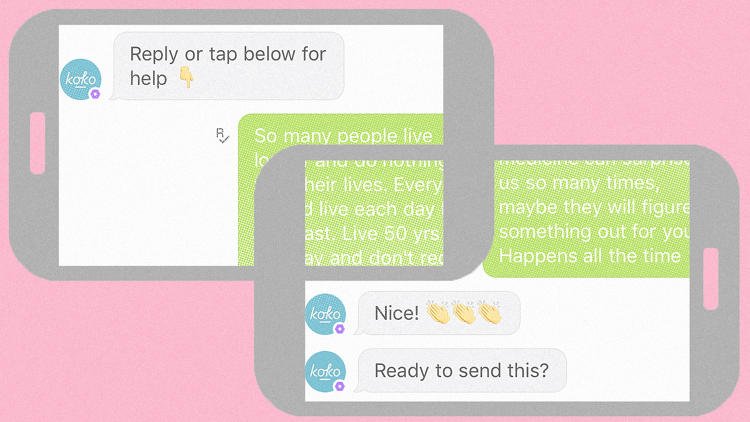

“I’m panicked,” I type into Kik. “I don’t have anything to wear for my interview tomorrow and my hair is being stupid.” A few minutes later, someone I’ve never met texts back: “It’s ok to look like what u really are.”
My problem was fake, but the response was articulate, sensitive, and most of all, very human. I’ve just received some decent life advice from an anonymous good Samaritan somewhere in the world, brought to me by a company called Koko.
Today, the startup is announcing a $2.5 million Series A round of financing, as well as the expansion its service to Facebook Messenger and the messaging app Telegram. But Koko’s larger strategy is to bring empathy to all the coldhearted chatbots like Alexa, Siri, and Cortana.

Launched in 2014 out of MIT’s Media Lab, Koko began as an invite-only social media network for enhancing emotional well-being, connecting users with problems to other users who might talk them through a tough situation. Koko became a public iPhone app, and through a partnership with Kik, an emotional tune-up service you could reach at any time with a simple text, as well.
But as it has expanded, Koko has invested in more than its human community; the company is building out its machine learning capabilities, too. Algorithms now sort and funnel requests to the most suitable users, not unlike the kind of AI we’ve seen put to use by the virtual assistant platform Clara. They’ve been eavesdropping, too, sorting out offensive content while learning how humans speak to one another through sensitive topics. Now, Koko services about 1,000 problems a day on Kik, and occasionally, the AI has grown smart enough to chime in before a human responder becomes available.
The end game? “We’re working toward providing empathy as a service to any voice or messaging platform,” says cofounder Fraser Kelton. “We think that’s a critical user experience for a world in which you’re conversing with computers.” Companies would license an empathy API from Koko, which could be built into any third-party chatbot, like sticking a heart into a robot.
The need is very real. A study published inJAMA found that smartphone AIs like Siri, Cortana, and Google Now were basically useless in responding to someone who expressed depression, physical ailments, or even sexual assault. In one cutting example, writer Sara Wachter-Boettcher pointed out that Siri didn’t understand when she typed “Siri I was raped.”
But what does a more sensitive chatbot sound like? In fact, Koko has shared a low-fi demo of how Alexa might act like if they plugged the Koko app into Amazon’s platform today:
To be fair, Alexa does acknowledge the emotional needs of someone who complains of being sad (recommending they listen to music, take a walk, or talk to a friend), though she is basically useless when the user expresses stress over a test or the loss of a loved one.
But infused with Koko (and more specifically, an AI armed with a library of responses already written by humans), Alexa gets a lot more exact. In the case of test anxiety, Alexa responds with several sentences of encouragement, acknowledging the situation, and putting a positive spin on it, too. Is she as competent as a clinical therapist? Maybe not. But at least the advice feels personalized and thoughtful.
Koko estimates it’s about six months from launch on the Amazon app, as it hopes to train the machine on more data before it launches the service, enabling the AI to do a majority of the responding (currently, most responses on Kik are by people). And it’s hard to imagine, even at that point, that Koko’s empathy engine will be developed enough to make the technology worth licensing because it was originally designed to have such specific, emotional problem-oriented conversations.

Indeed, Kelton acknowledges this shortcoming, and likens his company’s strategy and ambitions to that of the app Waze. “It started as a peer-to-peer app for tracking speed traps on highways,” Kelton says. “The by-product of that data is how you and I and millions of people know as Waze today: real-time traffic routing.”
With this first major injection of funding, the three-person Koko team wants to expand its ambitions, and its capabilities, to create a chatbot system that can not only respond to life’s most harrowing questions, but even catch the smaller ticks in our speech—the curt responses when we’re in a hurry or having a bad day, or the casual diction of someone who has nothing better to do than talk to a robot. It also must reconcile the fact that some of us won’t want to be so intimate with our robotic helpers.
“I think that, even when they respond [sensitively], there are going to be all these UX quirks to accommodate,” Kelton says. “If Alexa came back with empathy instantly [in duress], it would be like a friend shouting at you when you had a problem.”
Teaching Cortana, Siri, and Alexa to do more than crack some jokes is a lofty goal for even a much larger company than Koko. But one thing’s for sure: It doesn’t look like we’ll be talking to our computers less in the future than we are today. Eventually, they’ll have to learn some simple human decency from someone.
[Source:- Co design blog]





